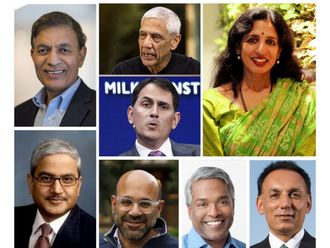
Dubai: Breathing problems. Leg pain. Sleepless nights. Mood swings. Exhaustion. Frustration. These are common manifestations of a life of obesity. And unfortunately, it’s a state that reached pandemic proportions across the world. In the UAE itself a Ministry of Health study found that around 20 per cent of the population suffers from obesity.
This doesn’t have to be homeostasis, however; there are enough weight-loss stories that prove that where there’s a will, there is a way.
So on World Obesity Day, marked annually on March 4, we look at some case studies, people like you and me who shed those kilos, how they did it and what the experts say about their way forward.
Case 1: Calorie-deficit diet, I lost 23kg in 5 months
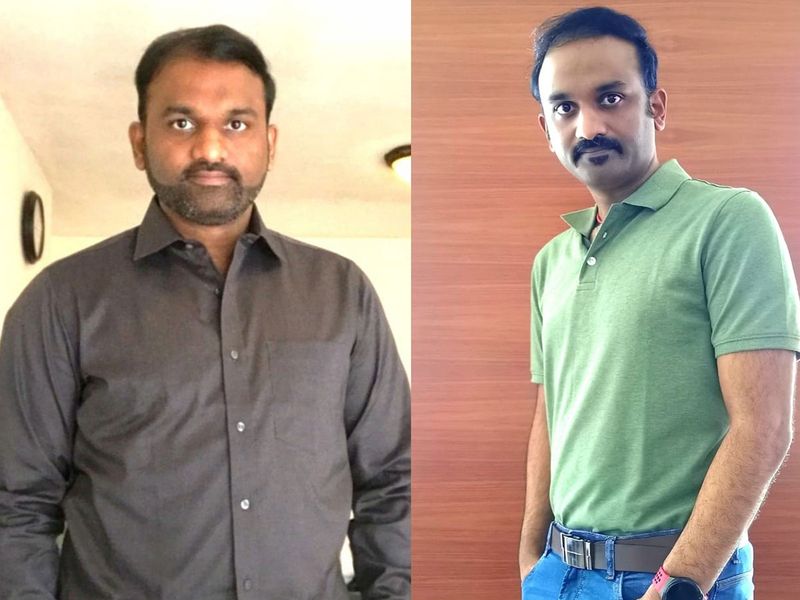
UAE-based Karthikeyan Anbarasan, from Chennai in India, is 170cm tall and lanky at 66kg. But about five months ago this wasn’t the case. He was 23kg heavier. “I’m from IT. So my lifestyle was late-nights, junk food,” explained the 36 year old in an interview with Gulf News. He was pre-diabetic. He couldn’t focus. He was tired. ALL.THE. TIME. And his kids – one five years old; the other three - made fun of his girth.
So after research, he decided to try a calorie deficit meal plan – he restricted himself to 1,000 calories a day -and focused on upping his intake.
Soon, as he lost weight, he found himself full of energy and able to play with his kids. The restrictiveness had been worth it.
Expert views:
Sakina Mustansir, Clinical Dietician at Prime Hospital, explains the pros and cons of the diet.
She writes: "Pros: Fast weight loss, motivation to keep going and stay on track, work harder
"Cons: The calories are too few to maintain long-term. Because they are too few, it may cause a drop in metabolism and an increase in hunger hormones.
"What he could have done differently: He could have maintained a 1,500-1,600 calorie plan with occasional drops in the intake in case of plateaus. Plus , a good home workout burning 400-500 calorie 5-6 days a week would help him stay healthy."
Ayaa Al Nimer, Clinical Dietician at Canadian Specialist Hospital, says: "An average man needs somewhere between 2,000-2,400 calories a day. While this need may fluctuate a bit, just 1000 calories a day is less. He might lose weight by doing this but this is not good for his body. "He should do a body composition analysis which will give him details like how much fat or protein he has in his body. If you follow the same diet for long periods of time, without eating from all food groups -- grain, protein, fruit, vegetables and dairy -- you might start developing nutrient deficiency in the long term. Also, when you decide to stop this diet and eat regular food you will start gaining all the lost weight or maybe more. This is why it is important for them to do things like frequent lab tests to see if they are having any deficiencies and get professional help with their diet."

If you follow the same diet on a daily basis without eating anything else you might start lacking other nutrients.
Yasmine Haddad, Clinical Dietitian, at myPediaClinic, says: "The long-term impact of practicing calorie-deficit diets may be malnutrition, muscle and hair loss as well as constipation."
"This type of diet should be followed under dietitian and physician supervision and for short periods of time and for specific medical outcome or purpose such as pre-operation."

This type of diet should be followed under dietitian and physician supervision and for short periods of time and for specific medical outcome or purpose such as pre-operation.
Case 2: WhatsApp support group, I lost 12kg in 7 months

Chetali Sachin Patil used the stillness brought about by COVID to reconnect with her friends and family across the world. Those who’d been procrastinating dropping weight made a WhatsApp group – a support system that would bring their own experiences with diet, exercise, recipes and so much more to the table. Together these women would motivate each other and learn from each other. At the end of seven months, Patil lost 12kg and gained much confidence. She also began to experiment in her kitchen and find healthy alternatives for the unhealthy options she usually went for.
Expert views:
Sakina Mustansir, Clinical Dietician at Prime Hospital, says: "Support group is the biggest pro of this experience; to encourage and build motivation and guide each other is very beneficial. Also she did not restrict her favorite foods but learnt how to make them in a healthier way and she inculcated her diet within her traditional and regular home foods which makes it sustainable throughout. She did not neglect workouts."
"Just like the previous case it is very important to do lab tests because only then she will know if she is having any deficiencies. After a point there might come a stage when her weight comes to a halt. It won’t increase and it won’t decrease. At this point she might have to change her exercise plan and also her diet plan.
"But then again, if she is consistently losing weight with her current programme by eating healthy and plans to make this a practice she can continue doing what she is doing."
Yasmine Haddad, Clinical Dietitian, at myPediaClinic, says: "This type of weight loss strategy is more sustainable, and its impact is long-term, as it emphasizss on habits and behavioral changes rather than food restriction and deprivation.
"However, for more efficient and effective results it is important to do checkup at GP and with dietitian to know if there is a need to couple this lifestyle change with any vitamins and to make sure that macronutrient intake is balanced and diverse for woman health."
Case 3: Next-level fasting, I lost 16kg in 100 days
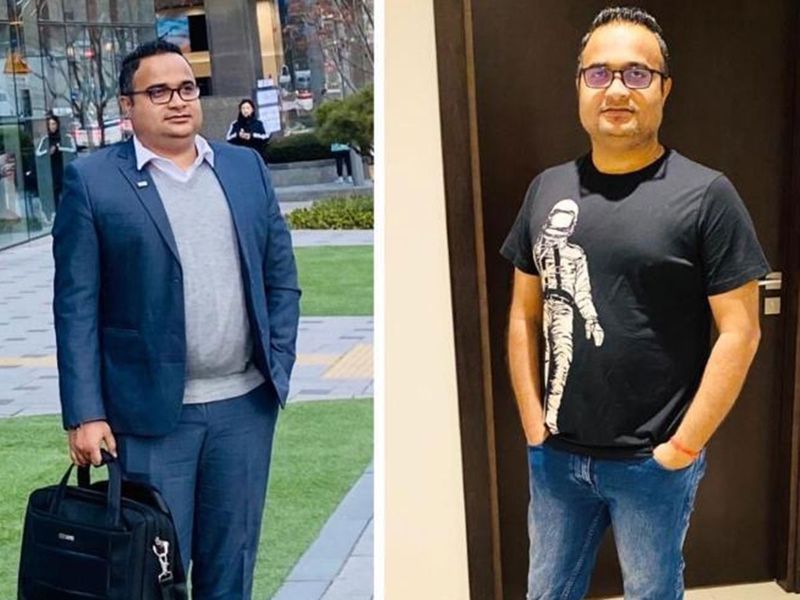
When Indian expat Prem Mishra, was out of breath playing with his two year old, that’s when it hit him. And when he saw photos of himself from a few years ago and then saw the mirror, he says: “I was ashamed.”
The 37-year-old knew he wanted to change, to get fit, but he was – and is – a self-confessed foodie. So he did something drastic. He stopped eating for 36 hours at a time.
During this period Mishra was advised to eat 500 calories, whether through a small meal or soup or salad. He cut this down to about 200 calories. “I was eating 100-200 calories in the form of 1-2 idlis (steamed rice cake), or besan chilla (gram flour pancake), or uttapam (pancake made with fermented rice), oats, low in carbs but filling and gives you good amount of energy [after 24 hours of complete fasting]. I was just calculating and keeping an eye on the calories I was eating,” he recalls.
For the first month Mishra did this version of a 36-hour fast. The next month he did 36-hour fasts twice a week. And then, in the third month he did 24-hour fasts 3 times in a week. Now, he’s on 24-hour fasts twice in a week.
His cheat day – each Friday – is without restriction. He eats what he wants, when he wants. These diet curbs alongside a 6-day exercise regimen that includes walking and yoga have left him 16kg lighter in about 100 days.
"So according to the intermittent fast plan that he chooses he will have 8 or 6 hours to eat in a day respectively. But that does not mean he can eat whatever he wants during these meals. He should keep a strict diet and stick to it to see the results.
"He should not do this diet that he is doing right now because there are many harmful effects to it like he might get hyperglycemia which is your body producing higher levels of sugar or glucose. There are also other effects like losing focus and not being able to concentrate or getting an ulcer if you don’t eat for such long period of time. I recommend he see a dietician because they will be able to tell him how can he lose weight fast without harming his body or doing things that might be harmful for his body in the long run."
Sakina Mustansir, Clinical Dietician at Prime Hospital, concurs. "While this plan offer fast weight loss, he must understand that fasting is not a diet. It's a way of life and it needs to be built gradually over time. 36hrs fasting is too extreme to begin with. Sustainability and maintenance is difficult on such extreme plans."
Case 4: Intermittent fasting, I lost 26kg in 4 months

In 2010, Khawar Naveed Bhatti suffered ACL (anterior cruciate ligament) tears that meant a sudden drop in activity and a sudden gain in weight. By May of 2019, Bhatti, whose height is 5 feet-10 inches, weighed 103kg. “Clearly, I needed a change,” he says. He discovered intermittent fasting during Ramadan that year, losing 8kg, by eating one healthy meal a day. In four months, he was down 26kg.
Yasmine Haddad, Clinical Dietitian, at myPediaClinic, says: "Some fad/strict diets if followed continuously and over long period of time may lead our weight to fluctuate. This is also known as the yo-yo effect of dieting. Yo-yo dieting involves periods of very low calorie intake and weight loss followed by the weight lost gained back in an even bigger amount. People with constant weight fluctuation are at a greater risk of several health problems than those who maintain a constant weight.
"When you yo-yo diet your body tends to lose fat and muscle but when most people put the weight back on they regain mostly the fat and little muscle. And since muscle is associated with a high metabolism, losing some of it will affect your metabolism but not permanently making it harder to lose weight the next time.
"Therefore, you should aim at reaching and maintaining a reasonable body weight, eating a healthy balanced diet, drinking enough water, exercising regularly inclusive of weight training and getting enough hours of sleep to rest your body."
Let's talk about being obese
First of all, what does it mean - to be obese? This is calculated depending on your BMI or body mass index, which is determined by your mass and your height.
Here's the formula:
BMI = a person's weight in kilos/their height in metres squared
Here's a quick chart:
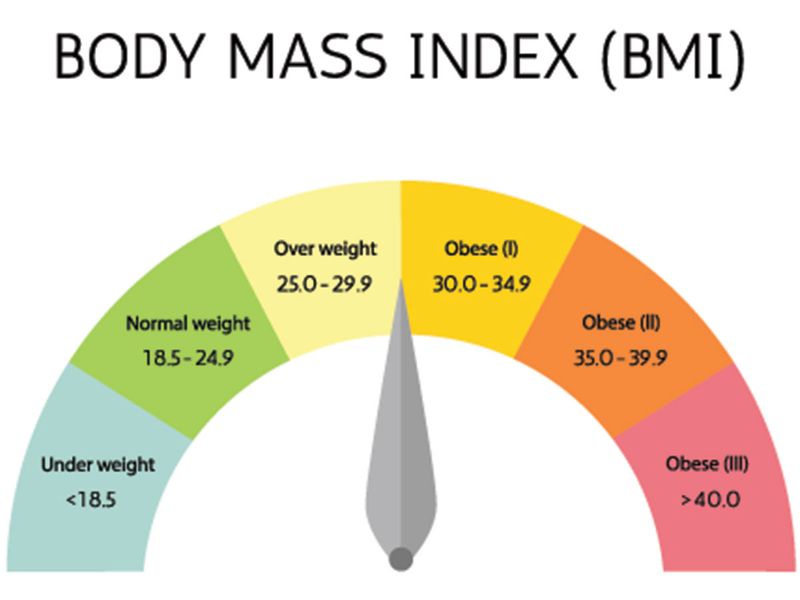
To get into fit mode, it's all about shrinking those fat cells. Why - because, you really can't get rid of them.
In the March 2 issue, Yale researchers wrote the findings of a study in the journal ‘Nature Cell Biology’ how quickly fat cells forms and what happens then. Weight gain is caused by the creation and expansion of white fat cells, or adipose tissue. In the study, which was undertaken on mice, they found that fat cell production starts within a day of starting a high-fat diet. Dieting can then shrink the cells, but not eliminate them. Once a fat cell, always a fat cell.
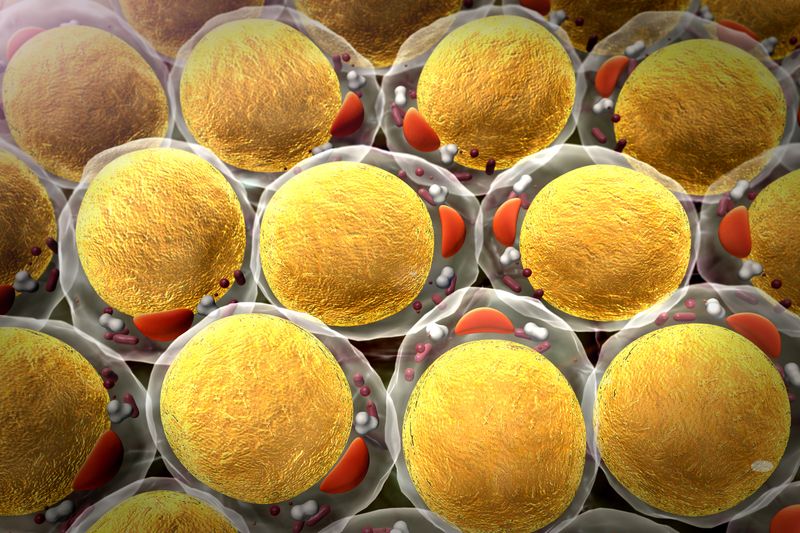
Dr Basim Alkhafaji, HOD, Obesity Surgeon at Canadian Specialist Hospital, and Academy Professor of Surgery, explains further. “Fat cells are what reserves our energy. Every time our body is in need of energy, which is all the time, it is these fat cells that give them the required energy to do their tasks. What happens to the fat cells of an obese body is that they expand. When he loses his weight these expanded fat cells shrink. It is impossible for a person to lose fat cells because that is needed for him to stay alive. Hence, no matter the size of his body the number of fat cells will remain the same. Which is why even people who lose weight can regain the lost weight. This would not be possible if you simply lost fat cells."
Why are some people more susceptible to getting fat?
There may be several factors leading to weight gain.
Medical troubles:
These include medical issues such as overproduction of hormones by the thyroid gland, polycystic ovary syndrome and insulin resistance. Gut health also plays a big part in weight fluctuations.
■ "Malabsorption occurs when your body is not able to digest the food you consume and your body is not able to absorb it properly. When you eat something is goes to your small intestine."
■ "Small intestine is what helps the body get the nutrients it wants from the food you consume and when this function does not smoothly happen, problems in your gut occurs. If you do not take care of this problem from the very beginning you might see fluctuation in your weight and sometimes might need surgery as well."

Emotional issues:
Emotional tussles – depression, sadness, etc.- may cause a person to overeat as well - this is usually refered to as emotional eating.
“Emotional eating or bingeing takes place when a person’s response to an emotional cue, serves as a bridge for their feelings and emotions," explains Sneha John, Clinical Psychologist, Camali Clinic Child & Adult Mental Health.

The essence of emotional eating is that food becomes a person’s response to emotional cues. Food may be a means of distraction to cope with uncomfortable emotions that the person is unable to consciously process. Emotional eating does not just apply to times of stress or sadness. It also accompanies celebration and can be excessive when people are happy. In other words, when you feel, you eat.
"The essence of emotional eating is that food becomes a person’s response to emotional cues. Food may be a means of distraction to cope with uncomfortable emotions that the person is unable to consciously process. Emotional eating does not just apply to times of stress or sadness. It also accompanies celebration and can be excessive when people are happy. In other words, when you feel, you eat.
"When we rely on emotions such as stress, happiness or sadness to feed eating patterns, the more we become dependent on food. No amount of food keeps the feelings down, hence the emotional eating turns into excessive eating. The moment we acknowledge our feelings, observe them and allow them to pass, food would no longer serve as a coping mechanism. We would be in control of our food choices and eating patterns, rather than vice versa."
Medicines and over eating
There are also some medicines that may cause a gut reaction that triggers the hunger hormone in a person, leading to weight gain.
How to be in control, eat right
Farah Hillou, Nutritionist at The Chiron Clinic, explains that there's more to sustainable weighloss than dumping the weight one time. "Consistent, sustainable weight loss involves addressing the multi-factorial causes of obesity, including hormonal imbalances, inflammation, environmental toxin exposure, nutritional deficiencies and excesses, stress and high cortisol levels, as well as poor sleep habits," she says.
Shirley D’Souza, certified Ketogenic & Primal Living Coach, says: “Diets that mean changing to a healthy lifestyle have one thing in common; it’s eliminating sugar, processed carbs like wheat GMO, dwarf wheat, starches, and preservatives.” One must eliminate anything that is chemical, processed, not natural. And diet specialists look into body chemistry, she adds, where they look at what a person may be intolerant to.
But while goals must be personalised some dietary habits we can all benefit from. Hillou lists them as:
- Practicing time restricted feeding, or doing an overnight fast for around 14 hours. This could promote hormone balance and weight loss.
- Including protein eg. Meats, fish, and legumes, and/or healthy fats like avocado, nuts and seeds at every meal and snacks. These help fill us up quickly and allow us to feel full for longer.
- Adding more fiber from leafy greens, legumes and wholegrains also promotes feelings of “fullness” and helps boost our beneficial gut bacteria.
- Practicing mindful eating, which allows us to enjoy what we are eating, promotes better chewing, and helps control portion size.
New ways to kill the weight: Reviewed
■ Cool-Tech
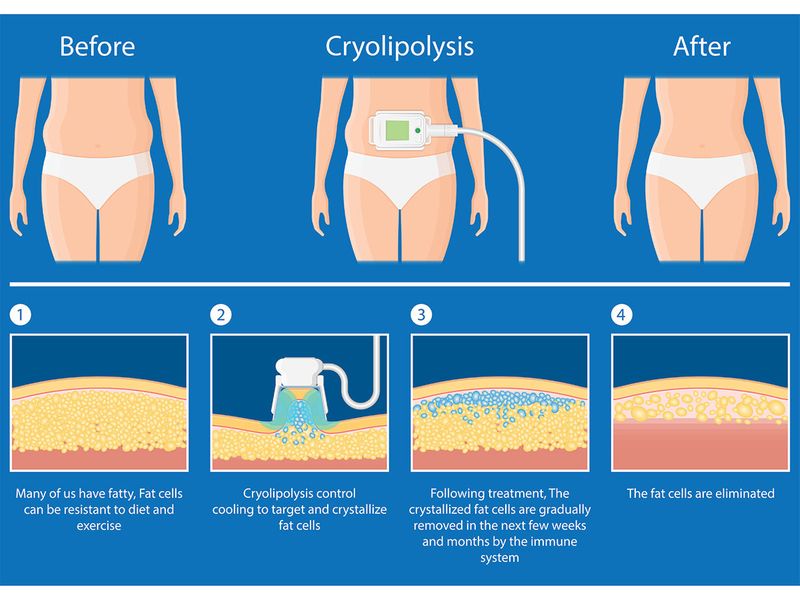
The proponents of this machine say they can freeze your fat cells, killing them and therefore forcing your body to expel it. Does it work? Here’s a quick review:
“Cool-Tech was just too fantastic a concept to skip; it freezes the flab, which then registers in your body as dead weight and a few weeks on…voila! Magic fix.
Note to self: Magic works in books, comics and other fantasy realms. Reality is always, always sloppier.
How does the technology work? Let’s see: first you mimic a dying fish on a massage table. After settling in and getting a cold patch applied to the area you are targeting – in my case, the tummy – the pods are stuck on. Yes pods; little square vacuums that tingle and singe as the lard trickles in. Now fixed, the machine chugs along, temperature dropping.
The pain – for it does hurt to be pinched – soon dulls to a throb and then numbness. The area around the space you are treating unfortunately hasn’t got the memo; be warned, angry, red splotches may appear. After a 60-minute class on hurt and patience comes the removal of the machine. I could not bear to watch, but as promised there were lumps and bumps which were kneaded by the therapist back into the body.
I lost about 600g that session. But the next two days I felt hungry as heck and a loss of control – of my stomach muscles. The result: a bloated belly that gets into a room before I do. Over the next few days it has gotten better; a massage has helped quell the mass a bit. In the long term though…the weight returns with a vengeance.
- Tried by K.N.
■ Gastric balloon
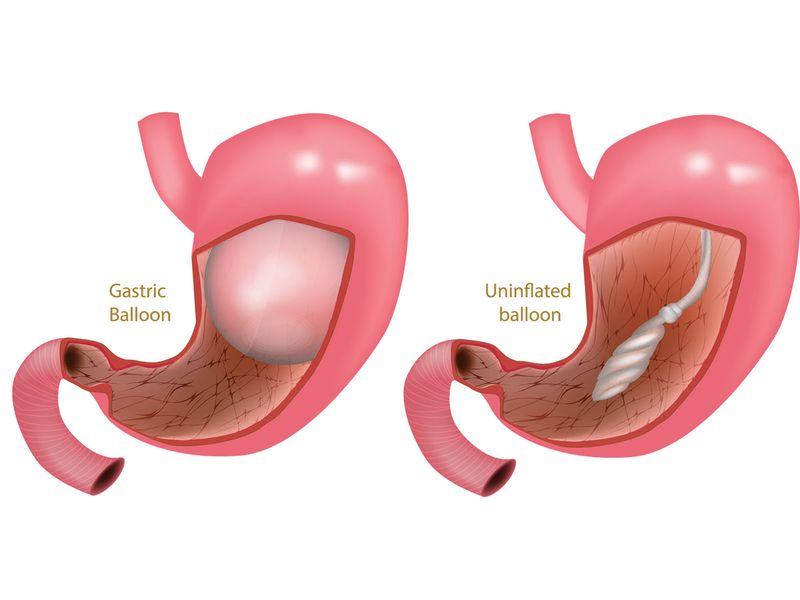
Lebanese expat Tala Harazallah has lost 13kg over five months using the Allurion Program’s gastric balloon, which she insists does not come with a terrible experience. It’s easy. Sit on doctor’s chair, swallow a pill. Have doctor inflate balloon, which is now in the stomach. Feel full. Take home a weighing scale with an app that connects directly to your phone. Now weight. There is some exhaustion, she admits, but it’s worth – the pounds come off quick. For three days though, you’ll be tired the whole time, shuffling your feet from one room to the other, and on a liquid diet. Then comes soft food and finally what you really feel like. Just don’t get dependent on it, she says. “It’s best to use this time to change your lifestyle so your new you can live a healthier happier life,” she says.
-Tala Harazallah
■ Creams and gels
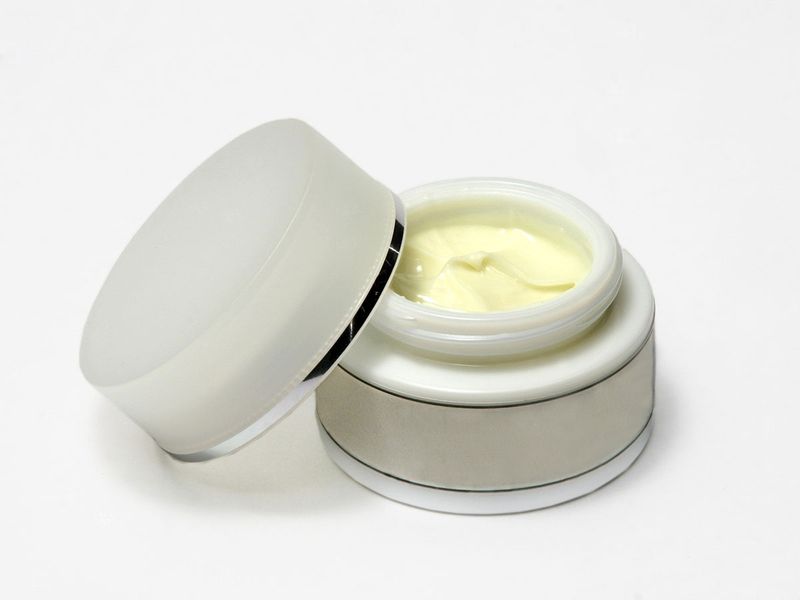
Syed H. started using warming gels to help his weight loss along at the insistence of his wife. He had stubborn belly fat and was looking for a little help to lose it. He tried various brands – some heating, some that evoked painful responses and others that just wasted his time. Finally, he’s found a brand that works for him. “Look at Amazon ratings carefully before you buy something,” he says. “That’ll give you a good idea of what works and what’s really just about making money.”
-Syed H., Gulf News Reader
■ Appetite suppressants… a year later and still unsure

I am someone who is so willing to spend money to aid my weight loss. Gym memberships, cute gym, clothes to motivate me to get up and work out and supplements. The latter is something that I’ve always been unsure about. But something about spending money on supplements and taking them every morning sort of keeps me on track. Not sure if it’s a placebo effect or if they really actually work.
My nutritionist gave me two supplements at one point during my weight loss journey, one of which is an appetite suppressant. It was a little 10g tube with powder flavoured like pineapple. I had to pour it in a glass of water and take it 30 minutes before my meal. I am someone who can easily be influenced with the power of the mind. Because I know I took an appetite suppressant, I start to imagine that I am totally eating less than I normally would. I am not sure the appetite suppressant made me feel more full faster, or whether this was just a way for me to tell myself to eat less. Basically my answer is, I have no answer. Did it work? A little bit at the start of my diet and then I just kind of stopped taking supplements and enjoying my life (and my appetite) a bit more.
– Yousra Zaki, Assistant Editor Features






